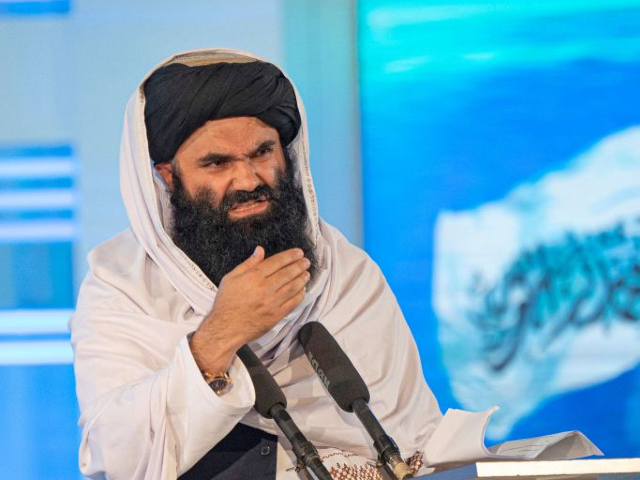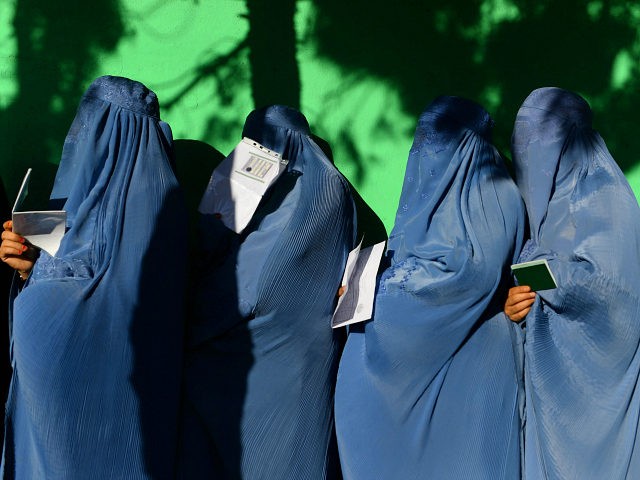Taliban “Interior Minister” Sirajuddin Haqqani, a seasoned terrorist with a $10 million FBI bounty on his head, told United Nations officials on Monday that the jihadis would soon offer a “reasonable and permanent solution” regarding girls’ and women’s education.
The Taliban, a Sunni radical jihadist organization, strongly opposes women’s rights. The jihadists governed Afghanistan throughout the 1990s, maintained a guerrilla insurgency against the U.S.-backed government during the 20 years of the Afghan war, and returned to power in August 2021 after then-President Ashraf Ghani fled the country. Ghani took a helicopter out of Afghanistan upon learning the news that the Taliban had reached the nation’s capital, Kabul, and still claims to be the legitimate head of state of the country despite residing in the United Arab Emirates (UAE).
The Taliban’s return to power was facilitated by leftist President Joe Biden announcing in early 2021 that he would not respect the terms of an agreement his predecessor Donald Trump had brokered with the Taliban and extend the two-decade-old American military presence in the country from its May 1, 2021, deadline into September. Biden ultimately withdrew troops from Afghanistan in August after the Taliban, in response to the deal being broken, launched a national attack against the demoralized Afghan armed forces, which ceased to exist upon the Taliban’s takeover of Kabul.

Taliban Interior Minister Sirajuddin Haqqani in Kabul on April 28, 2022. (WAKIL KOHSAR/AFP via Getty Images)
Shortly after the Taliban’s return to power, its top spokesman Zabihullah Mujahid told reporters that the terrorists would respect girls’ and women’s rights to an education, prompting positive responses from the United Nations and other international actors. Taliban leaders took little time to break that promise. The Taliban took over Afghanistan on August 15, 2021; by August 24, Mujahid was ordering all women and girls to stay home until further notice as much as necessary, an order the Taliban has yet to revoke.
The Taliban announced it would ban all girls over the age of sixth grade from going to school in March 2022. In November, authorities banned women from colleges, claiming too many women were not wearing fundamentalist Islamic garb appropriately and otherwise violating its extremist interpretation of sharia, or the Islamic law. The Taliban has also since banned women from working for humanitarian aid organizations.
The move prompted dozens of women to take to the streets of Kabul to protest, which the Taliban responded to by sending thugs to beat the women in the street. That decision also resulted in an exodus of humanitarian aid funding and U.N. money, which appears to have triggered conversations with supporting global agencies on the matter. The Taliban-controlled Bakhtar News Agency reported on Tuesday that “Interior Minister” Sirajuddin Haqqani discussed the topic with the head of the United Nations Assistance Mission in Afghanistan (UNAMA), Markus Potzel, and promised a “solution.”
“For his part, Interior Minister Haqqani said in this meeting that the leadership of the Islamic Emirate thinks for the well-being of the people and is committed to it,” Bakhtar relayed. “He added that efforts are being made to solve the problems and a reasonable and permanent solution is being worked on; to be consistent with Sharia rules and the culture of our people.”
The country’s acting Interior Minister Khalifa Sirajuddin Haqqani met with UNNAM envoy Markus Potzel, and Scott Smith Deputy Director for Political Affairs on Monday.https://t.co/FDmJJEFlAt pic.twitter.com/6VKnwacBoq
— Bakhtar News Agency (EN) (@BakhtarNA_EN) January 3, 2023
The propaganda outlet did not offer any details as to what a “reasonable and permanent solution … consistent with Sharia rules” would look like.
Bakhtar claimed that Potzel thanked Haqqani, a wanted terrorist, and other leaders in the Interior Ministry “for their cooperation and the improvement of the security situation” in addition to concerns regarding girls and women in school.
UNAMA confirmed the meeting on Tuesday but stated only that Potzel “conveyed [the international community’s] call to lift bans on work & education for women & girls.”
“The ban on Afghan women aid workers will deepen the humanitarian crisis creating greater economic misery & further Afghanistan’s isolation,” UNAMA stated.
.@PotzelMarkus met today Siraj Haqqani, dfa @moiafghanistan
UN envoy conveyed IC’s call to lift bans on work & education for women & girls. The ban on Afghan women aid workers will deepen the humanitarian crisis creating greater economic misery & further #Afghanistan's isolation
— UNAMA News (@UNAMAnews) January 2, 2023
A spokesman for the Interior Ministry, Abdul Nafay Takor, later said of the meeting that Haqqani vowed “efforts are underway to address the problem,” referring to girls and women having a right to education, according to the Afghan news site Khaama Press.
As interior minister, Sirajuddin Haqqani maintains outsized control of the decision-making regarding women’s access to daily life in Afghanistan. Haqqani is a senior member of the namesake Haqqani Network, the terrorist bridge organization connecting the Taliban to al-Qaeda, and is believed to have been harboring al-Qaeda chief Ayman al-Zawahiri when American forces eliminated him in a drone strike in a wealthy Kabul neighborhood last year. Reports indicated at the time that Zawahiri was staying in a Haqqani property and regularly took air on its balcony with no disguise.
Shortly after the Taliban took over the country, U.S. State Department spokesman Ned Price falsely claimed that the Haqqani Network and the Taliban were “separate entities” with no relation. The Taliban subsequently placed multiple Haqqani family members in ministry positions.
Sirajuddin Haqqani has previously not indicated that he is open to any compromise with the international community on human rights. In remarks following Zawahiri’s killing in August, Haqqani emphasized the Taliban would not negotiate with the international community.
“Don’t sit on the hopes of others, there are some talk saying ‘accept this and we will accept that with you,’ if we had accepted these with you, we would have not fought you for the last 20 years. We accept but based on the Islamic and national principles,” Haqqani insisted.
Follow Frances Martel on Facebook and Twitter.

COMMENTS
Please let us know if you're having issues with commenting.